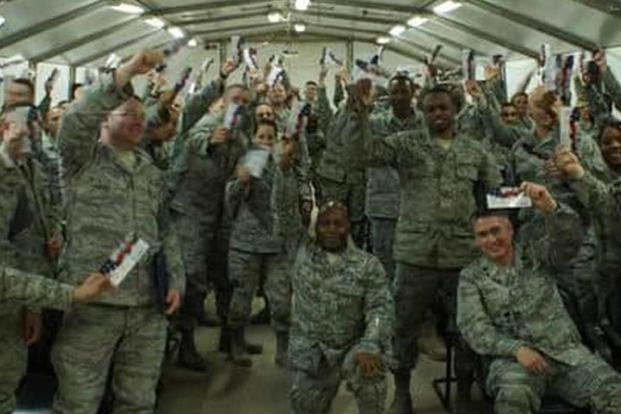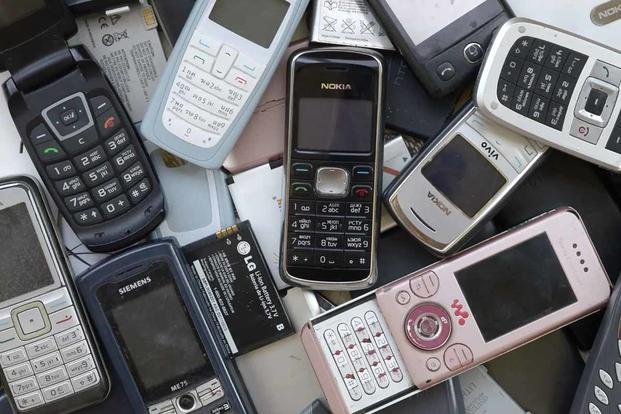In 2004, brother and sister duo Rob and Brittany Bergquist started a small campaign to help a soldier deployed to Afghanistan. His wireless bill had ballooned to a whopping $8,000 as he tried to keep in touch with his wife and son. The Bergquists learned two valuable lessons. First, they were good at fundraising. Second, Americans want to help their service members and veterans.
“I was getting ready for school one morning, and I heard the story of this guy. He was from Natick, Massachusetts, and that was a couple towns over from where I grew up,” Rob Bergquist told Military.com. “I was 12, Brittany was 13 and I had two cousins that were deployed in Afghanistan, so we just grabbed our piggy bank money, we went to school and got some more lunch money.”
They raised $21, but after telling their parents what they were trying to do, the Bergquists began holding bake sales, car washes, anything to help out. When they made national news, people began sending in their old cell phones.
Read Next: Hearing Aid Manufacturer ReSound Develops New App to Relieve Tinnitus Symptoms
Over the course of the next 20 years, the two expanded their support for U.S. troops and vets through Cell Phones for Soldiers, a nonprofit organization that recycles old mobile phones, chargers, tablets and other electronics. With the funds generated by recycling those devices, they offer free mobile talk time and calling cards, free phones, paid services and one-time emergency cash assistance to veterans.
“It’s been my life’s work, I guess you could say,” Bergquist said. “I’ve been doing it for a long time, so I’m very proud of it. It’s helped a lot of people, and it’s a lot of fun to do.”
The idea of providing no-cost or low-cost telephones or internet access is nothing new. In 1984, the Ronald Reagan-era Federal Communications Commission (FCC) implemented the Lifeline Program, which provides subsidized phone lines (and later expanded to internet service) to low-income households. The idea was that Americans who couldn’t afford telecommunications services would not be able to apply for work, report emergencies or otherwise participate in civil society.
Cell Phones for Soldiers’ concept is the same, allowing veterans to keep in touch with loved ones, find work and be otherwise reachable for all of life’s necessities (although, despite the name of the nonprofit, the program is not limited to Army members; it’s open to members from other branches).

“What’s different about Cell Phones for Soldiers Mobile is, we are going out and finding the veteran that needs this. We’re going to where the veteran is,” said Bergquist. “We give them an entry-level smartphone. We give them unlimited talk text and data for one year. We live in this hyperconnected world where if you are not able to be reached or you can’t reach someone, you are just falling behind.”
Veterans, of course, need connectivity for more than just finding work. Some veterans already feel disconnected from society and need access to the resources available to them, including mental health crisis lines and contact with loved ones.
“It isn’t just a program for the veteran,” he said. “We’ve already heard from caseworkers that have this. They can keep in contact with the vets they’re trying to serve. A veteran service officer looking to keep in touch with veterans, when they [veterans] have a cell phone, they can keep in touch with them. So there’s so many benefits to having a cell phone.”
Brittany is 34 years old now and Rob is 33. In the 21 years that passed since the Bergquists tried to help their first soldier, they have not only helped thousands of returning veterans and deployed service members, but also expanded what their nonprofit can do for other U.S. service members. Cell Phones for Soldiers’ next step is creating a geo-located app that will connect vets to services near where they are.
“Half a mile down the road, there might be a warm shower. Pep Boys might be looking to hire veterans in their area. A discount finder can help them go get discounted food,” he said. “We’re really just trying to dial in the phones and the service right now, but that’s coming down the pipeline. We’re not quite there yet, but that’s the kind of thing you need a cell phone for.”
On top of providing cell phones and service, they offer phone cards for members abroad through their Minutes That Matter program, allowing troops to call home for free. The Helping Heroes Home program offers a one-time emergency cash assistance payment through an easy application process (an email with some basic information). Once the story is confirmed, the money is sent. The entire process usually takes less than 30 days. Veterans have requested help for everything from utility payments and rent to essential car repairs.

“We wanted to continue to use the revenue we were generating from all these cell phones we were receiving and get them out to the community,” said Bergquist. “We started doing emergency grants in the transition phase, and now we have Cell Phones for Soldiers Mobile, which is assisting low income and homeless veterans with cell phone service. And we still provide the one-time funding in specific cases, but really now most of the budget is allocated to Cell Phones for Soldiers Mobile.”
Cell Phones for Soldiers does all of this just by recycling your old cell phone (along with taking cash donations). As of 2024, the nonprofit organization has recycled some 25 million phones to generate more than 450 million minutes of free calling time and currently enjoys a four-star rating on Charity Navigator.
Aside from donating your old cell phone, readers can help by organizing a cell phone/device donation drive in their area or become a cell phone drop-off site, accepting other people’s donations and making it cheaper for the charity to ship donations. To learn more about Cell Phones for Soldiers, to donate or volunteer, visit the Cell Phones for Soldiers website.
Want to Learn More About Military Life?
Whether you’re thinking of joining the military, looking for post-military careers or keeping up with military life and benefits, Military.com has you covered. Subscribe to Military.com to have military news, updates and resources delivered directly to your inbox.
Story Continues
Read the full article here

